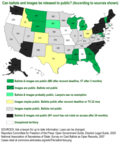Secret ballot
Secret Ballot is a voting method in which a voter's choices in an election or a referendum are anonymous. This voting method is one of the cornerstones for ensuring free and fair elections, safeguarding the privacy of voters' choices, and preventing attempts to influence the vote through bribery, coercion, or retaliation. The secret ballot is also known as the Australian ballot, named after its early implementation in Australia in the 1850s.
History[edit]
The concept of the secret ballot dates back to ancient times, with examples found in Ancient Greece and the Roman Republic. However, it was not until the 19th century that the secret ballot began to be widely adopted around the world. The system was first introduced in Australia in the 1850s, leading to its alternative name, the Australian ballot. Following its success in preventing electoral fraud and intimidation, the practice spread to other countries, including the United Kingdom with the Ballot Act of 1872 and subsequently to the United States and other nations.
Implementation[edit]
The implementation of the secret ballot involves providing a private space at polling stations where voters can mark their ballots shielded from the eyes of others. The ballots are then placed in a sealed box, which is opened and the votes counted in a controlled environment, ensuring the anonymity of each vote. Modern implementations of the secret ballot may also include electronic voting systems, where measures are taken to protect the privacy of the voters' choices.
Advantages[edit]
The primary advantage of the secret ballot is the protection of voter privacy, which helps to ensure that votes are cast free from pressure, fear of retribution, or the influence of bribery. This contributes to the integrity of the electoral process, promoting democratic principles and the legitimacy of election outcomes.
Challenges[edit]
While the secret ballot is crucial for free and fair elections, its implementation faces challenges, including ensuring the security of the voting process, preventing voter fraud, and maintaining the secrecy of the vote in the face of evolving technologies. Additionally, there are concerns about the accessibility of secret ballot systems for voters with disabilities or those living in remote areas.
Global Use[edit]
Today, the secret ballot is a standard practice in democracies around the world. Its use is often mandated by law or constitution, reflecting its importance in the democratic process. However, the specific methods and technologies used to ensure ballot secrecy can vary widely from one country to another.
See Also[edit]
-
Luis Guillermo Solís, elecciones abril 2014
-
Wikisource logo
-
An Election III, The Polling, by William Hogarth
-
Cardiganshire Election ballot paper 1880
-
1900 New York polling place
-
Ballot FOIA
-
Keep images
-
Top voter
Ad. Transform your life with W8MD's Budget GLP-1 injections from $75


W8MD offers a medical weight loss program to lose weight in Philadelphia. Our physician-supervised medical weight loss provides:
- Weight loss injections in NYC (generic and brand names):
- Zepbound / Mounjaro, Wegovy / Ozempic, Saxenda
- Most insurances accepted or discounted self-pay rates. We will obtain insurance prior authorizations if needed.
- Generic GLP1 weight loss injections from $75 for the starting dose.
- Also offer prescription weight loss medications including Phentermine, Qsymia, Diethylpropion, Contrave etc.
NYC weight loss doctor appointmentsNYC weight loss doctor appointments
Start your NYC weight loss journey today at our NYC medical weight loss and Philadelphia medical weight loss clinics.
- Call 718-946-5500 to lose weight in NYC or for medical weight loss in Philadelphia 215-676-2334.
- Tags:NYC medical weight loss, Philadelphia lose weight Zepbound NYC, Budget GLP1 weight loss injections, Wegovy Philadelphia, Wegovy NYC, Philadelphia medical weight loss, Brookly weight loss and Wegovy NYC
|
WikiMD's Wellness Encyclopedia |
| Let Food Be Thy Medicine Medicine Thy Food - Hippocrates |
Medical Disclaimer: WikiMD is not a substitute for professional medical advice. The information on WikiMD is provided as an information resource only, may be incorrect, outdated or misleading, and is not to be used or relied on for any diagnostic or treatment purposes. Please consult your health care provider before making any healthcare decisions or for guidance about a specific medical condition. WikiMD expressly disclaims responsibility, and shall have no liability, for any damages, loss, injury, or liability whatsoever suffered as a result of your reliance on the information contained in this site. By visiting this site you agree to the foregoing terms and conditions, which may from time to time be changed or supplemented by WikiMD. If you do not agree to the foregoing terms and conditions, you should not enter or use this site. See full disclaimer.
Credits:Most images are courtesy of Wikimedia commons, and templates, categories Wikipedia, licensed under CC BY SA or similar.
Translate this page: - East Asian
中文,
日本,
한국어,
South Asian
हिन्दी,
தமிழ்,
తెలుగు,
Urdu,
ಕನ್ನಡ,
Southeast Asian
Indonesian,
Vietnamese,
Thai,
မြန်မာဘာသာ,
বাংলা
European
español,
Deutsch,
français,
Greek,
português do Brasil,
polski,
română,
русский,
Nederlands,
norsk,
svenska,
suomi,
Italian
Middle Eastern & African
عربى,
Turkish,
Persian,
Hebrew,
Afrikaans,
isiZulu,
Kiswahili,
Other
Bulgarian,
Hungarian,
Czech,
Swedish,
മലയാളം,
मराठी,
ਪੰਜਾਬੀ,
ગુજરાતી,
Portuguese,
Ukrainian








